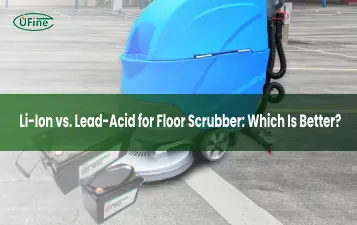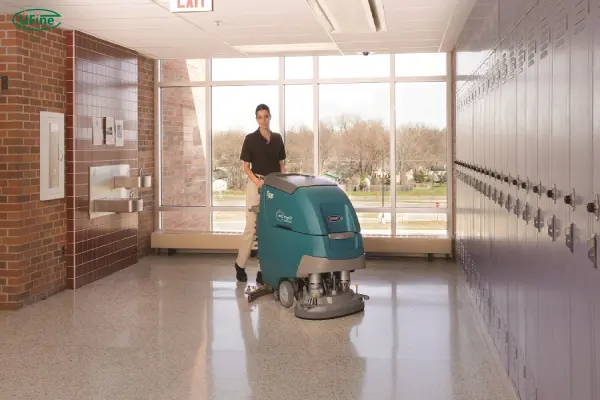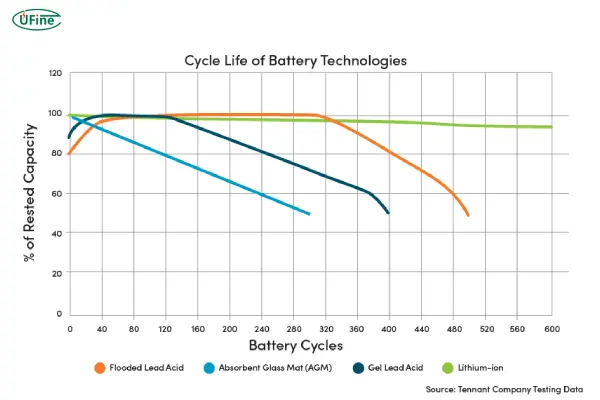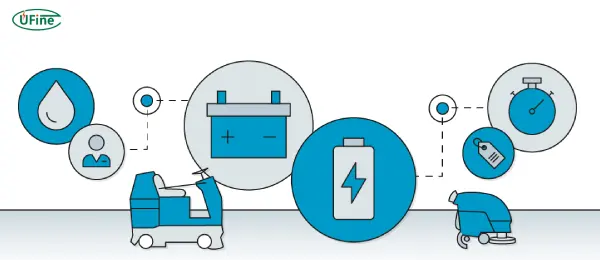In this guide, we’ll explore how floor machine batteries work, why they matter, and how to pick, replace, and maintain the right one for long-term performance. If you want to reduce downtime, boost cleaning efficiency, and avoid costly battery problems, read on.
Part 1. How does the battery power the floor machine?
Every floor cleaning machine needs energy to run its motor, vacuum, and sometimes even water dispensing systems. In most modern machines, especially cordless ones, this energy comes from a floor machine battery.
Here’s what happens:
- The battery stores electrical energy as chemical energy.
- When the machine is turned on, the battery sends current to the motor and control circuits.
- This powers everything—from the brush rotation and vacuum suction to the movement of wheels (in ride-on models).
- Some machines also use battery power for LED indicators, pressure sensors, or electronic controls.
So basically, the battery isn’t just a part of the machine. It’s the lifeblood. If your battery fails, your floor machine turns into an expensive, heavy cart.
Part 2. How a good battery enhances floor machine performance
A high-quality floor machine battery does much more than keep your device running. It directly affects:
- Cleaning efficiency: A full-strength battery delivers consistent power, so your brushes maintain their torque and speed.
- Runtime: Good batteries run for hours, not minutes—important for large commercial or industrial floors.
- Productivity: No sudden shutdowns or delays between charging. You can finish tasks faster.
- Reliability: You don’t need to worry about voltage drops or erratic power that could damage internal components.
- Machine life: Stable voltage protects the motor and electrical systems, reducing wear and tear.
Think of your battery as your cleaning partner. If it’s strong and steady, your job becomes much easier—and your machine lasts longer.
Part 3. Types of floor machine batteries
There are several battery types used in floor scrubbers, polishers, and burnishers. Each type has unique benefits and downsides:
1. Lead-Acid Batteries (Flooded)
- Traditional and affordable.
- Require regular watering.
- Can spill acid if mishandled.
- Heavy and bulky.
2. AGM (Absorbent Glass Mat) Batteries
- Sealed and spill-proof.
- No need for watering.
- Maintenance-free.
- Slightly more expensive than flooded types.
3. Gel Batteries
- Sealed and vibration-resistant.
- Good for uneven floors.
- Deep cycle capability.
- More expensive than AGM.
4. Lithium-Ion Batteries
- Lightweight and compact.
- Long life span and fast charging.
- No maintenance required.
- Highest upfront cost—but worth it for long-term use.
At Ufine Battery, we specialize in custom lithium battery packs for all kinds of floor machines. Whether you need compact LiPo, high-capacity LiFePO4, or cylindrical 18650 cells, we’ve got you covered.
Contact Ufine Battery for tailor-made battery solutions that meet your exact specifications.
Part 4. Average life comparison of different battery types
How long a battery lasts depends on its chemistry, usage, and maintenance. Here’s a quick comparison:
| Battery Type | Average Cycle Life | Typical Runtime per Charge | Notes |
|---|---|---|---|
| Lead-Acid | 300–500 cycles | 2–4 hours | Budget-friendly, but short lifespan |
| AGM | 400–600 cycles | 2.5–4.5 hours | Maintenance-free |
| Gel | 500–800 cycles | 3–5 hours | Excellent deep-cycle performance |
| Lithium-Ion | 1000–3000 cycles | 4–8 hours | Long-lasting and efficient |
As you can see, lithium-ion batteries not only last longer but also deliver more power per charge. That’s why more floor machines today are switching to lithium technology.
Part 5. Key features to look for in a floor machine battery
Choosing the right floor machine battery means more than just matching size or voltage. Here are the top 7 features to look for:
1. Battery Capacity (Ah)
A higher amp-hour rating means longer runtime. Always check if the capacity suits the size and workload of your machine.
2. Cycle Life
This tells you how many times the battery can be charged and discharged before losing performance. Aim for at least 500 cycles or more.
3. Voltage Stability
Good batteries maintain a steady voltage, even under load. This is crucial for consistent brush speed and suction.
4. Charging Time
Faster charging means less downtime. Lithium batteries often recharge in 2–3 hours compared to 8+ hours for lead-acid.
5. Maintenance Requirements
Flooded batteries need watering. AGM and lithium are maintenance-free—ideal for busy facilities.
6. Weight and Size
Lithium batteries are much lighter and smaller, making machines easier to maneuver.
7. Safety Features
Look for built-in protection against overcharging, short-circuiting, and overheating.
If you’re building or upgrading a floor machine, Ufine Battery can help you find a power solution that checks all these boxes. We provide custom battery packs designed for performance, durability, and safety.
Part 6. How to replace a floor machine battery
Replacing your floor machine battery is simple if you follow the right steps:
- Turn off and unplug the machine.
- Open the battery compartment—usually under a seat or behind a panel.
- Disconnect terminals carefully. Always remove the negative (–) cable first.
- Lift out the old battery (use gloves if it’s lead-acid).
- Clean the terminals and battery tray using baking soda and water.
- Install the new battery, aligning it with the correct polarity.
- Reconnect terminals—positive (+) first, then negative (–).
- Secure the battery in place and close the compartment.
- Charge fully before use.
Always use batteries recommended by your manufacturer—or reach out to Ufine Battery for professional help choosing the right fit.
Part 7. What affects the life of a floor machine battery?
Battery life is not just about specs. Usage and care play a huge role. Here are some key factors:
- Overcharging or undercharging
- High discharge rates
- Extreme temperatures
- Incorrect charging equipment
- Irregular maintenance
- Frequent deep discharges
- Cheap or low-quality batteries
Want a battery that lasts longer and performs better? Choose high-quality lithium batteries from Ufine Battery, designed to resist these common stressors.
Part 8. Maintenance tips to extend battery life
Here are simple, proven tips to help your battery last longer:
- Charge after every use, but don’t overcharge.
- Avoid full discharges—try to recharge before the battery hits 20%.
- Store in a cool, dry place.
- Clean terminals regularly to avoid corrosion.
- Check water levels if using lead-acid batteries (use only distilled water).
- Use the correct charger to avoid voltage mismatch.
- Avoid overloading the machine, which drains power faster.
With proper care, you can add months or even years to your battery’s usable life.
Part 9. Conclusion
Your floor machine battery isn’t just a part—it’s the power core. A weak or worn-out battery affects every part of your cleaning workflow. But the right battery? It brings your machine to life, helps you finish jobs faster, and saves money in the long run.
If you’re looking for a trusted battery supplier for your floor scrubber, polisher, or cleaning robot, Ufine Battery is here to help. We offer high-performance custom lithium battery solutions, from compact LiPo to industrial-grade LiFePO4 and cylindrical 18650s. All tailored to your voltage, capacity, size, and performance needs.
Contact Ufine Battery today for custom floor machine battery packs that power up your business—quietly, reliably, and efficiently.
Part 10. FAQs
How often should I replace a floor machine battery?
Depending on the type, every 1–5 years. Lithium batteries last the longest.
Can I upgrade to lithium if my machine uses lead-acid?
Yes, but make sure voltage and size are compatible. Ufine Battery offers upgrade kits.
What if my battery doesn’t hold a charge?
It could be due to aging, deep discharge, or faulty cells. Time to test or replace it.
Can I use any charger for my battery?
No. Always use the recommended charger for your battery type.
What’s the best battery for heavy-duty cleaning?
Lithium-ion batteries offer the best power, runtime, and lifespan for tough jobs.
Related Tags:
More Articles

Li-Ion vs. Lead-Acid for Floor Scrubber: How to Choose?
Wondering which floor scrubber battery is better? Compare Lithium-Ion vs. Lead-Acid batteries for performance, lifespan, and cost. Make the right choice!
Vacuum Cleaner Battery Guide: Power, Types & Lifespan
Discover vacuum cleaner battery types, performance, lifespan, cost, and maintenance tips. Learn to pick, replace, and care for your vacuum’s power source.
The Ultimate Guide to Humidifier Batteries
Portable humidifier batteries explained—find the right capacity, charging speed, and maintenance tricks for your device.
What Does Battery Group Size Mean?
Battery group size refers to a battery's standard dimensions and terminals. It ensures proper fit and performance for your car or equipment.
What Is a Battery Conditioner? And Why It Matters for Lithium Batteries
A battery conditioner maintains and extends lithium battery life by keeping it charged, clean, and healthy. Learn how it works and why it matters






